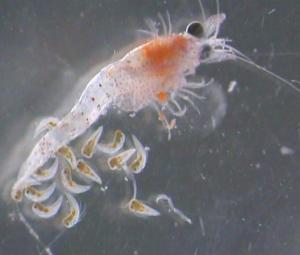An AFBI led study in Upper Lough Erne reveals presence of the Bloody Red Shrimp.

A new invasive species, the Bloody Red Shrimp (Hemimysis anomala), has been discovered for the first time in Northern Ireland in Upper Lough Erne, according to researchers in the Agri-Food and Biosciences Institute (AFBI), Belfast. The discovery was made during a fish survey for the Northern Ireland Environment Agency, in conjunction with an AFBI led INTERREG IVa funded DOLMANT Project focussing on the development of lake management tools.

“The Bloody Red Shrimp is distinctive from the native shrimp species due to its orangey red transparent colouration and unlike similar native species it can be observed swarming in shaded areas during the day. Red swarms of the shrimp have been seen in marinas throughout the Shannon River.”
Dr Robert Rosell, senior fish biologist at AFBI, comments on this significant find:
“This species is similar to the established non-native zebra mussel that originated in the Ponto-Caspian region of Eastern Europe and has gradually spread westward. Once introduced into the river system here it has expanded its range probably as a result of leisure craft moving between river catchments via the Shannon-Erne canal.”
DOLMANT Project leader Dr Yvonne McElarney explains that, as with other invasive species, the main concern of the Bloody Red Shrimp is the potential adverse impact on the ecology of a lake. She commented, “This species is known as a voracious predator that has the potential to have a serious impact on plankton composition. Findings such as this underpin the importance that the DOLMANT project has on understanding the lake ecosystem and the impact of change in lakes”.
The Northern Ireland Environment Agency works in partnership with agencies north and south to implement management plans to reduce the impact of Invasive Alien Species on native Biodiversity. Stephen Foster from NIEA added:
“Invasive alien species are widely recognised as one of the greatest threats to our native biodiversity. Once an invasive species has established within a habitat its spread can be rapid, out-competing native species. It is extremely important that we all do that we can to minimise the risk of spreading or introducing non-native invasive species.”
Notes to editors:
AFBI carries out high quality technology research and development, statutory, analytical, and diagnostic testing functions for DARD and other Government departments, public bodies and commercial companies.
AFBI's Vision is “Scientific excellence in Northern Ireland … serving the world”.
All media enquiries to AFBI Press Office.
Latest news
- AFBI issues Nematodirus warning – Spring 2025 11 April 2025
- Managing Nature Based Risks to the UK Economy and Opportunities for Green Finance 08 April 2025
- AFBI Hillsborough host AERA committee 27 March 2025
- The Omics Days Conference 27 March 2025
